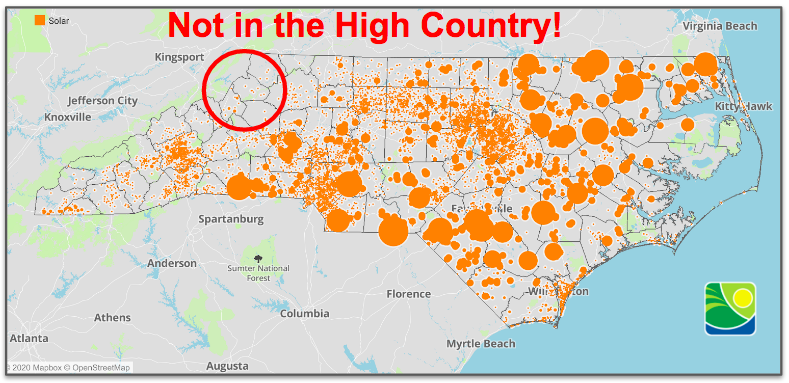By Caitlyn Daas, N.C. Energy Democracy Assistant Spring 2020

More than 150 people attended the High Country Energy Justice Summit in February. Photo by Eric Halvarson
Thanks to the tireless advocacy of young climate activists, people across the world are waking up to the fact that, despite decades of international meetings and agreements about climate, we are not on track to avert the worst consequences of climate change.
Not. Even. Close.
That was the message of youth climate activists from Sunrise Boone and the Appalachian Climate Action Collaborative who provided an update on the global climate crisis at the first High Country Energy Justice Summit in Boone. More than 150 people came out to the summit on a Saturday in late February to support the youth climate leaders in their own community and to participate in a discussion about what their own local energy utilities should be doing to address the climate crisis and create renewable energy jobs in the North Carolina High Country.
Joining those youth-led organizations in hosting the summit were Appalachian Voices, the grassroots group Climate/Transition Blue Ridge and the statewide Energy Justice NC Coalition. More than a dozen participants said that the summit energized them and other local residents to start thinking about and planning what the local community can do to address the climate crisis. (see video below)
The summit began with members from Sunrise Boone and ClimACT talking about the roots of the climate crisis. The youth climate activists shared research from climate scientists that shows that the crisis our planet is facing is not only an unnatural phenomenon, but is largely caused by the impacts of humans’ extraction and consumption of the planet’s fossil fuels. Our continued dependence on fossil fuels is a massive contributor to the crisis we are now facing. Humans have developed a reliance on fossil fuels, and carbon pollution from these resources is a major cause of global warming and the resulting feedback loops that create risks to Earth’s ecological balances and even the livability of our planet.
Participating organizations provided information to summit participants on what their local energy companies are doing to confront the climate crisis, and the updates were far from encouraging. The two local energy utilities in the area are Blue Ridge Energy, which is a member-owned electric cooperative, and New River Light & Power, which is owned and operated by Appalachian State University. The Southern Environmental Law Center, a nonprofit law firm, recently reported that the solar policies of these utilities rank among the worst for all electric utilities in the Southeast.
The impact of those policies are evident in a map of North Carolina’s solar installations. While the state as a whole is a leader in the transition to renewable energy, ranking third in the country for installed solar, that transition lagging behind in the High Country (see map).

There isn’t much installed solar in the NC High Country, according to this map of installed solar produced by the North Carolina Sustainable Energy Association and accessed Feb. 5, 2020.
Aside from Blue Ridge Energy’s community solar program, which is cost-prohibitive for homes that don’t use a lot of electricity, ratepayers in the High Country have no option to purchase renewable energy. The current system for rooftop solar is also designed in a way that makes going solar more costly for low- and middle-income households.
The results from ratepayer surveys at the High Country Energy Justice Summit also demonstrated that many local residents see their electric utilities as unresponsive, non-transparent and undemocratic institutions. Ratepayers at the summit concluded that they did not see themselves as a significant part of the decision-making process of their utilities. If communities had a direct say and more power in having their needs met from state and local utilities, we would have cleaner energy and people would be better protected during times of struggle.
In the current health crisis of COVID-19, transparency and democracy are especially important. Folks are losing access to employment as a result of quarantining and precautionary measures during the global pandemic. People who have recently lost employment or are seeing pay reductions related to the crisis may not have the income necessary to pay monthly bills.
Organizations around the Southeast are pushing for utilities to postpone monthly bills during the current COVID-19 outbreak. Ideally, this would include suspending additional late fees and penalties on delayed and accumulated payments, suspension on service disconnection, and reconnection for homes that have been recently disconnected from service. This would allow ratepayers to pay monthly bills at a later date, and not accumulate penalties or late fees or face disconnections that could exacerbate the COVID-19 health crisis.
The coalition of local organizations that hosted the summit, and many of the participants, plan to continue working together to monitor the progress of our local utilities in providing better access to renewable energy and energy efficiency options, providing more transparency and access to decision-making and, ultimately, in transitioning Boone and the surrounding areas away from reliance on fossil fuels.
We know that folks from the High Country care about the climate crisis. We are asking you to participate in this process, and together, we can work towards energy democracy in our community!
Be on the lookout for more utility-focused events in the High Country — online and, when we can, in-person — as well as updates on NC utilities’ responses to the COVID-19 pandemic. Future event plans for energy democracy will be concentrated specifically on Blue Ridge Electric Membership Corporation and New River Light and Power. Updates to NC utilities’ responses to the COVID-19 outbreak can be found at energyjusticenc.org.
To join the movement towards energy democracy in the High Country, email Caitlyn Daas at caitlyn.daas@appvocies.org or call Appalachian Voices’ Boone office at (828) 262-1500.



Leave a Reply